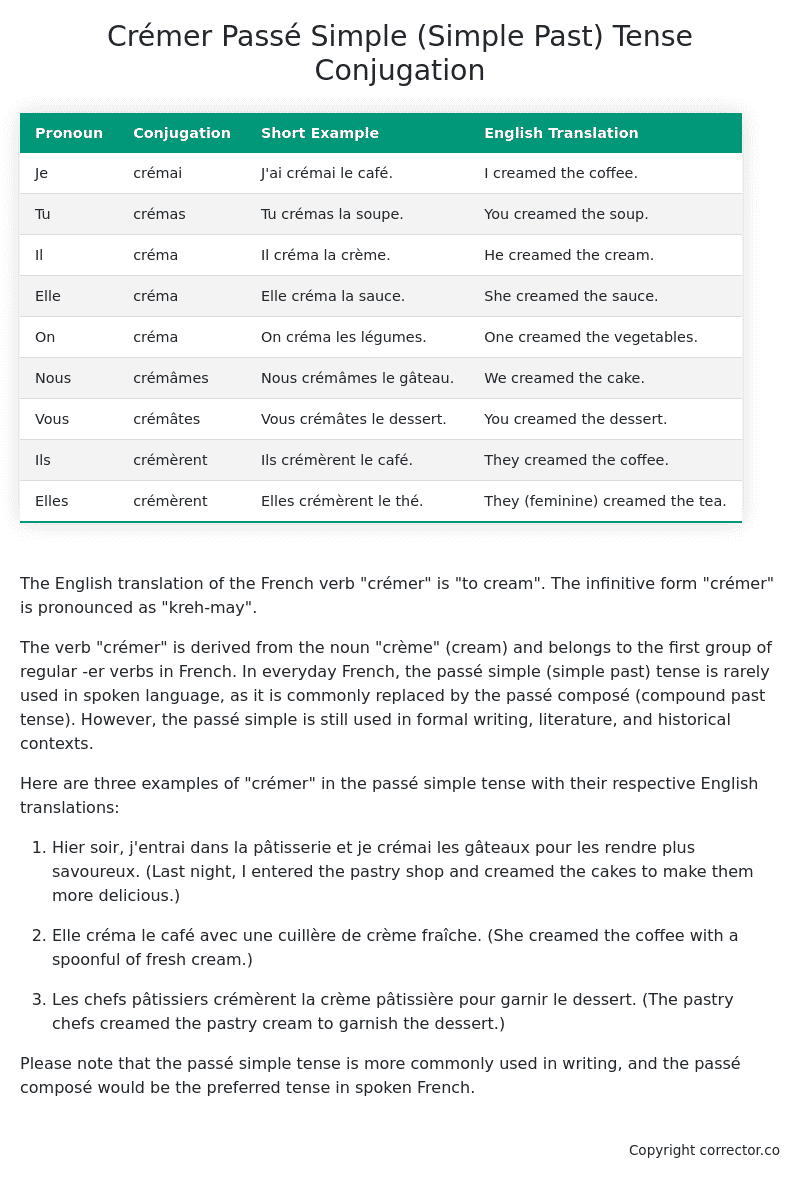Passé Simple (Simple Past) Tense Conjugation of the French Verb crémer
Introduction to the verb crémer
The English translation of the French verb “crémer” is “to cream”. The infinitive form “crémer” is pronounced as “kreh-may”.
The verb “crémer” is derived from the noun “crème” (cream) and belongs to the first group of regular -er verbs in French. In everyday French, the passé simple (simple past) tense is rarely used in spoken language, as it is commonly replaced by the passé composé (compound past tense). However, the passé simple is still used in formal writing, literature, and historical contexts.
Here are three examples of “crémer” in the passé simple tense with their respective English translations:
-
Hier soir, j’entrai dans la pâtisserie et je crémai les gâteaux pour les rendre plus savoureux.
(Last night, I entered the pastry shop and creamed the cakes to make them more delicious.) -
Elle créma le café avec une cuillère de crème fraîche.
(She creamed the coffee with a spoonful of fresh cream.) -
Les chefs pâtissiers crémèrent la crème pâtissière pour garnir le dessert.
(The pastry chefs creamed the pastry cream to garnish the dessert.)
Please note that the passé simple tense is more commonly used in writing, and the passé composé would be the preferred tense in spoken French.
Table of the Passé Simple (Simple Past) Tense Conjugation of crémer
| Pronoun | Conjugation | Short Example | English Translation |
|---|---|---|---|
| Je | crémai | J’ai crémai le café. | I creamed the coffee. |
| Tu | crémas | Tu crémas la soupe. | You creamed the soup. |
| Il | créma | Il créma la crème. | He creamed the cream. |
| Elle | créma | Elle créma la sauce. | She creamed the sauce. |
| On | créma | On créma les légumes. | One creamed the vegetables. |
| Nous | crémâmes | Nous crémâmes le gâteau. | We creamed the cake. |
| Vous | crémâtes | Vous crémâtes le dessert. | You creamed the dessert. |
| Ils | crémèrent | Ils crémèrent le café. | They creamed the coffee. |
| Elles | crémèrent | Elles crémèrent le thé. | They (feminine) creamed the tea. |
Other Conjugations for Crémer.
Le Present (Present Tense) Conjugation of the French Verb crémer
Imparfait (Imperfect) Tense Conjugation of the French Verb crémer
Passé Simple (Simple Past) Tense Conjugation of the French Verb crémer (You’re reading it right now!)
Passé Composé (Present Perfect) Tense Conjugation of the French Verb crémer
Futur Simple (Simple Future) Tense Conjugation of the French Verb crémer
Futur Proche (Near Future) Tense Conjugation of the French Verb crémer
Plus-que-parfait (Pluperfect) Tense Conjugation of the French Verb crémer
Passé Antérieur (Past Anterior) Tense Conjugation of the French Verb crémer
Futur Antérieur (Future Anterior) Tense Conjugation of the French Verb crémer
Subjonctif Présent (Subjunctive Present) Tense Conjugation of the French Verb crémer
Subjonctif Passé (Subjunctive Past) Tense Conjugation of the French Verb crémer
Subjonctif Imparfait (Subjunctive Imperfect) Tense Conjugation of the French Verb crémer
Subjonctif Plus-que-parfait (Subjunctive Pluperfect) Tense Conjugation of the French Verb crémer
Conditionnel Présent (Conditional Present) Tense Conjugation of the French Verb crémer
Conditionnel Passé (Conditional Past) Tense Conjugation of the French Verb crémer
Conditionnel Passé II (Conditional Past II) Tense Conjugation of the French Verb crémer
L’impératif Présent (Imperative Present) Tense Conjugation of the French Verb crémer
L’impératif Passé (Imperative Past) Tense Conjugation of the French Verb crémer
L’infinitif Présent (Infinitive Present) Tense Conjugation of the French Verb crémer
L’infinitif Passé (Infinitive Past) Tense Conjugation of the French Verb crémer
Le Participe Présent (Present Participle) Tense Conjugation of the French Verb crémer
Le Participe Passé (Past Participle) Tense Conjugation of the French Verb crémer
Struggling with French verbs or the language in general? Why not use our free French Grammar Checker – no registration required!
Get a FREE Download Study Sheet of this Conjugation 🔥
Simply right click the image below, click “save image” and get your free reference for the crémer Passé Simple tense conjugation!

Crémer – About the French Passé Simple (Simple Past) Tense
Formation
Usage
Narration
Historical Context
Interactions with other tenses
Passé Composé
Imparfait
Conditional and Subjunctive
Summary
I hope you enjoyed this article on the verb crémer. Still in a learning mood? Check out another TOTALLY random French verb conjugation!


